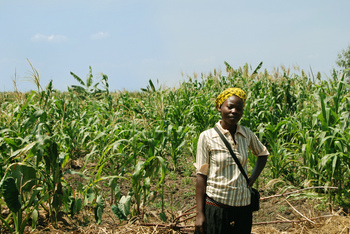by Evelyn Cash
I really don’t watch much TV anymore. When I want to catch up on the
shows I’m interested in, I turn to Hulu. A few weeks ago, began noticing ads on Hulu for a website called “Kiva”
that allows people all over the world to make micro-loans to
entrepreneurs primarily in developing countries. To be honest, I
thought the idea sounded interesting but I didn’t think much of it.
And then recently, I was listening to one of my favorite podcasts, “Stuff You Should Know”
and Josh & Chuck began talking about starting a team on Kiva to
bring their listeners together to make a difference.
Well, now my interest was piqued so I decided to check the site out.
It turns out that Kiva has been featured on CNBC, FOX, Forbes.com, Time
and many other news and entertainment outlets, so I thought it was
about time to get this up for those who read this blog. Kiva was
founded in 2005 by Matt and Jessica Flannery after witnessing the power
of micro-loans first hand during a trip to east Africa a year earlier.
Microfinancing provides savings, loans and other financial services to
the poor and usually involves small amounts of money. Micro-loans
allow people who wouldn’t normally have access to traditional financing
to obtain relatively small loans for a variety of purposes (source: “About Microfinance”).
Just one year after it’s founding, Kiva loaned over $1 million and the
site has been steadily growing since that time. By November of 2008,
$50 million in micro loans had been made through Kiva and the site is
still going strong (source: “Background”).
Kiva
allows users to make loans of as little as $25 to entrepreneurs around
the world using the website. You can simply browse through the
listings of entrepreneurs who have been approved for loans through
Kiva’s micro-lending partners and choose the individual or group you
want to loan to. I opened up an account on Thursday and made my first
$25 loan to a farmer in Togo
who was $50 away from raising $900 for fertilizer. By Friday morning,
she had reached her goal and I received and email informing me that the
funds had been distributed to her through the micro-lending partner in
Togo. I have to say that it gave me a great feeling to know that I had
helped
her raise her funds and that she could use the money to help her
produce
corn and other crops to sell and feed her family. According to the
it’s website, Kiva’s micro-lending partners have repayment rate of about 98%
so there is a good chance that the loan will be repaid by the end
of it’s 18 month life. At that point, I can either donate the money to
Kiva or loan it to another entrepreneur and keep the ball rolling.
It
is clear that Kiva is a company that recognizes interdependence and
puts it to work in a very practical way. It’s given me and the other
575,000+ Kiva lenders an opportunity to actually make a difference in
the lives of people that we wouldn’t normally know anything about. As
a Buddhist, I look at Kiva and see the teachings of interdepence,
karma, loving-kindness, generosity and compassion working in real-time
for everyone involved. But, I think anyone who recognizes human
suffering and the value of reaching out a hand to help can plainly see
the benefit of a site like Kiva.
So, I encourage anyone who
reads this post to at least check out the Kiva website and browse through the
stories, I found the site both interesting and inspiring. Also, if
anyone has more experience with Kiva (afterall, I’m a brand new member)
please comment with your story. We’d love to hear from you!
UPDATE 10/19: Thanks to commenter “SR” for pointing out some of the criticisms regarding Kiva’s communications. For more information on how Kiva micro-loans work, I encourage you to check out this blog post from Tactical Philantropy and Kiva’s updated “How Kiva Works” page. As noted in the former article, Kiva’s practices are actually better at helping impoverished entrepreneurs get a start, however I think that whenever money is involved, you can never have enough information.


